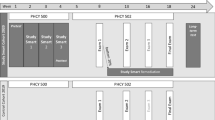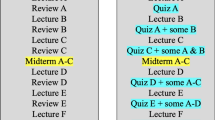Abstract
We report a curricular exercise with two principal goals: (a) training medical students to integrate several key elements derived from basic science content to answer patient’s question and (b) enhancing students’ understanding and retention of scientific content. In this assignment, students are presented with a scenario in which a hypothetical patient asks the question, “Hey, Doc, can I safely eat the genetically modified salmon?” The students are expected to construct a cogent and succinct response, applying principles learned in class to address the question posed by the patient. In order to determine whether completion of the homework assignment enhanced the students’ understanding and retention of scientific content, performance on pre- and post-exercise examinations were compared on (a) “project” questions that tested key concepts reinforced by the assignment and (b) “control” questions that tested concepts covered in class but not explicitly reinforced by the exercise. We found that the degree of difficulty for the control questions increased by about 15% over a period of 1 month while the degree of difficulty for the project questions held steady over the same period. These results suggest that the assignment aided students in internalizing key concepts, transferring them from temporarily memorized knowledge to longer-term ideas that could be applied to new problems.




Similar content being viewed by others
References
Adams NE. Bloom’s taxonomy of cognitive learning objectives. J Med Libr Assoc. 2015;103(3):152–3.
Aleven VAWMM, Koedinger KR. An effective metacognitive strategy: learning by doing and explaining with a computer-based cognitive tutor. Cogn Sci. 2002;26:147–79.
Anderson L, Krathwohl DA. Taxonomy for learning, teaching and assessing: a revision of Bloom’s taxonomy of educational objectives. New York: Longman; 2001.
Berardi-Coletta B, Buyer LS, Dominowsky RL, Rellinger ER. Metacognition and problem-solving: a process-oriented approach. J Exp Psychol Learn Mem Cogn. 1995;21:205–23.
Bielaczyc K, Pirolli PL, Brown AL. Training in self-explanation and self-regulation strategies: investigating the effects of knowledge acquisition activities on problem solving. Cogn Instr. 1995;13:221–52.
Chi MTH, deLeeuw N, Chiu MH, Lavancher C. Eliciting self-explanations improves understanding. Cogn Sci. 1994;18:439–77.
D’Eon MF. Knowledge loss of medical students on first year basic science courses at the University of Saskatchewan. BMC Med Educ. 2006;6:5.
Ferguson-Hessler MGM, de Jong T. Studying physics texts: differences in study processes between good and poor performers. Cogn Instr. 1990;7:41–54.
Hawkins RE, Welcher CM, Holmboe ES, Kirk LM, Norcini JJ, Simons KB, Skochelak SE. Implementation of competency-based medical education: are we addressing the concerns and challenges? Med Educ. 2015;49:1086–102.
Lazic E, Dujmovic J, Hren D. Retention of basic sciences knowledge at clinical years of medical curriculum. Croat Med J. 2006;47:882–7.
Lee HS, Anderson JR. Student learning: what has instruction got to do with it? Annu Rev Psychol. 2013;64:445–69.
Rico E, Galindo J, Marset P. Remembering biochemistry: a study of the patterns of loss of biochemical knowledge in medical students. Biochem Educ. 1981;9:100–2.
Rumsey DJ. Statistics for dummies. 2nd edn, Wiley; 2011. http://www.dummies.com/how-to/content/how-to-compare-two-population-proportions.html.
Smith MK, Wood WB, Adams WK, Wieman C, Knight JK, Guild N, Su TT. Why peer discussion improves student performance on in-class concept questions. Science. 2009;323:122–4.
US Food and Drug Administration. 2010. FDA veterinary medicine advisory committee briefing packet AquAdvantage Salmon: FDA Center for Veterinary Medicine, Rockville.
van Eenennaam AL, Muir WM. Transgenic salmon: a final leap to the grocery shelf? Nat Biotechnol. 2011;29(8):706–10.
van Mariënboer JJ, Sweller J. Cognitive load theory in health professional education: design principles and strategies. Med Educ. 2010;44:85–93.
Yaskowiak ES, Shears MA, Agarwal-Mawal A, Fletcher GL. Characterization and multi-generational stability of the growth hormone transgene (EO-1a) responsible for enhanced growth rates in Atlantic salmon. Transgenic Res. 2006;15(4):465–80.
Acknowledgements
The authors would like to thank Drs. Martha Faner, Carol Wilkins, Shawna Nantais, and John Wang for their help in the development of this exercise and Dr. John Wang for his help in grading essays and for critical review of this manuscript. This work has been supported by the Dr. Ruth M. Allen Endowed Fund for Medical Education to the Office of Medical Education Research and Development, College of Human Medicine, and by the Office of Academic Programs in the College of Osteopathic Medicine at Michigan State University, East Lansing, MI.
Author information
Authors and Affiliations
Corresponding author
Ethics declarations
Ethics Approval
The Michigan State University Institutional Review Board on Human Subjects has approved these studies (IRB numbers x13-813e and i044320).
Notes on Contributors
Jana M. Simmons earned her Ph.D. in biochemistry and a Certificate in College Teaching in 2010 and is now an Assistant Professor in the College of Human Medicine at Michigan State University. Her main focus is effective integration of basic sciences into clinically driven curricula.
Raquel P. Ritchie earned her Ph.D. in molecular biology and genetics in 2007 and did post-doctoral research in stem cell biology. She is now an Assistant Professor in the College of Osteopathic Medicine at Michigan State University. Her main focus is multidisciplinary approaches to medical education.
Electronic supplementary material
Rights and permissions
About this article
Cite this article
Simmons, J.M., Ritchie, R.P. Training Students to Answer Layman’s Questions Also Helps in Retention of Scientific Content. Med.Sci.Educ. 27, 33–39 (2017). https://doi.org/10.1007/s40670-016-0357-1
Published:
Issue Date:
DOI: https://doi.org/10.1007/s40670-016-0357-1




